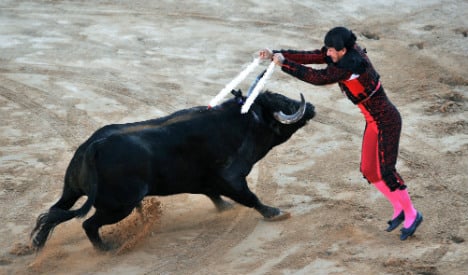The town hall of Aldaia in the Community of Valencia set a referendum last week, asking its population of 31,000: “Are you in favour of or against having bull-fighting activities in the plaza during local festivities in Aldaia?”
The final tally on Sunday night showed that more than half – 1,801 – voted that they were opposed to bullfighting activities while about 43 percent – 1,418 – voted in favour, according to local newspaper Las Provincias.
Still, less that 15 percent of the voting population participated in the referendum.
Aldaia's bull fests are known for an event called toro embolado: literally “bull with balls”, it involves placing flammable balls on a bull's horns, lighting the balls on fire and then setting the bull free.
According to Spanish daily ABC, the referendum would take effect for the bull fests next summer, but the president of the Federation of Bullrunning Clubs said that there was a need to fight to protect the festivals' traditions.
“These celebrations are protected in the Constitution and no one can eliminate them, in fact, we should protect them,” bullrunning federation president Vicente Nogueroles told Las Provincias.
Aldaia's vote is part of a growing trend of Spaniards turning against the centuries-old tradition. Regional elections in May saw the rise of many left-wing leaders who are less favourable towards bullfighting events.
Madrid's new mayor Manuela Carmena ended annual subsidies to a prestigious bullfighting school and also gave up the city council's private bullfighting ring box.
Valencia's regional government said it would stop paying subsidies to bullfighting events. A mayor in one Valencian town who said the local government would stop subsidizing bullfights said she started receiving death threats after the announcement.
Thousands across the country have also signed a petition against the Spanish Education Ministry's plan to introduce bullfighting classes in schools.
In Seville on Monday, the anti-bullfighting sentiment was quite visible after a statue of a famous bullfighter outside a bullring was vandalized with the words “torture is not culture” and “killer”, according to El Pais. The hands of the sculpture depicting matador Curro Romero are also painted red, as well as his mouth.
Una estatua de Curro Romero amanece con pintadas antitaurinas https://t.co/zHx0N0Q7sJ Via @el_pais @elpaisandalucia pic.twitter.com/7xmk8eq3lt
— Paco Puentes (@pacopuentesfoto) November 23, 2015
Catalonia approved legislation to ban bullfighting five years ago, and the Canary Islands were the first community to ban the activity in 1991.
On the other hand, San Sebastian's new administration this summer overturned a ban on bullfighting brought in three years ago by the outgoing leftist pro-independence coalition, Bildu, government.
This summer was one of the deadliest for Spain's bullrunning fests with 12 people being gored to death.



 Please whitelist us to continue reading.
Please whitelist us to continue reading.
Member comments